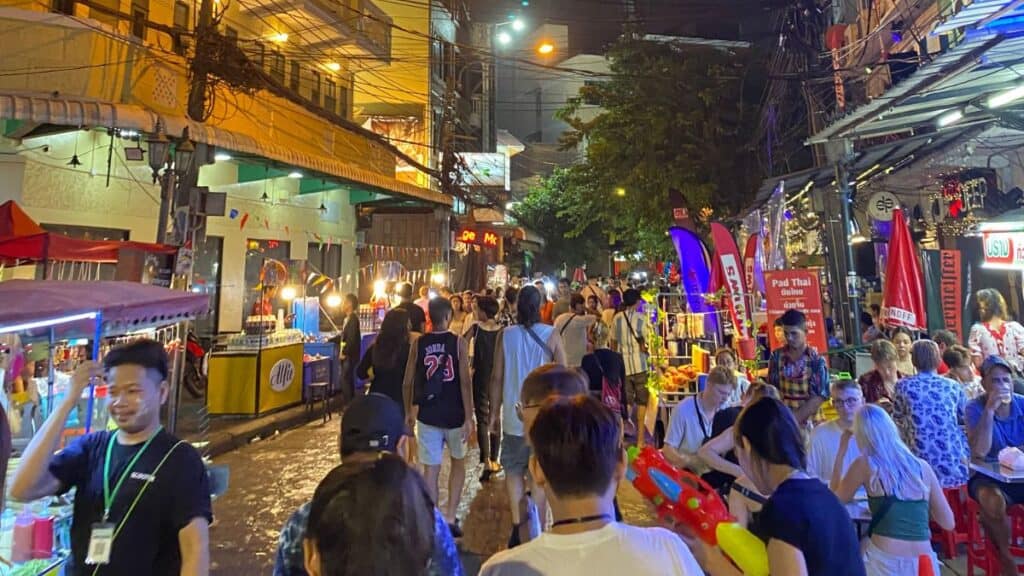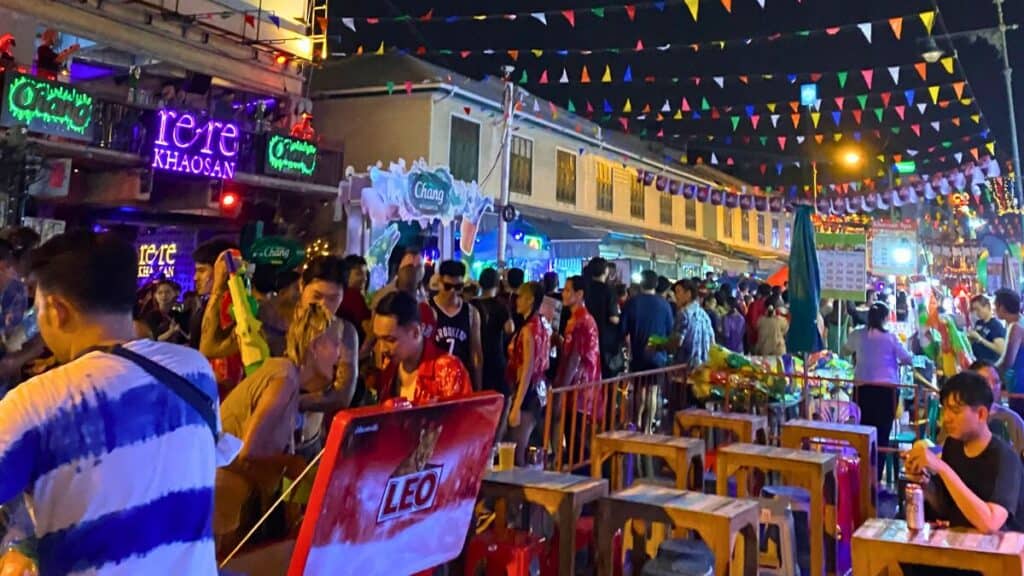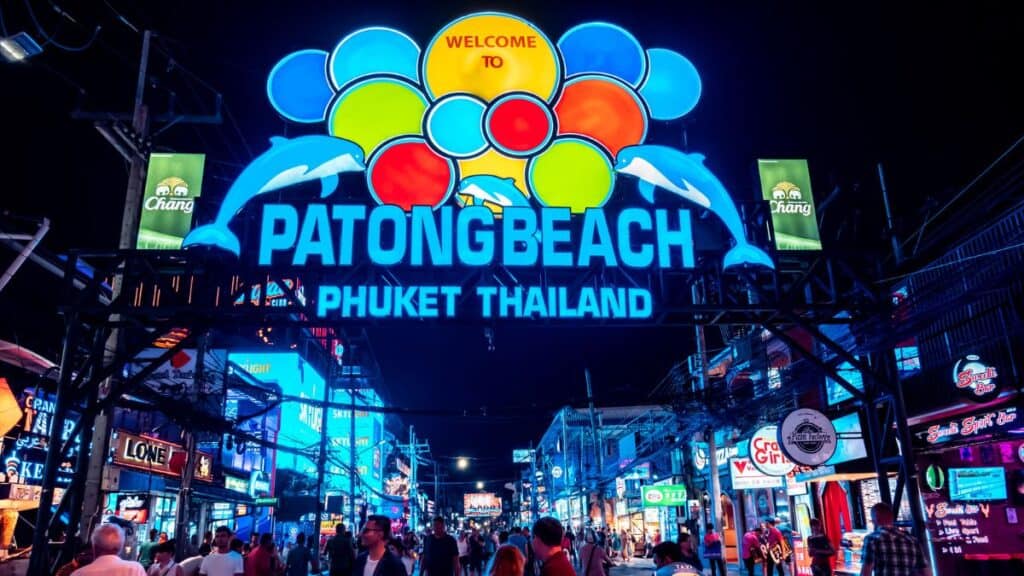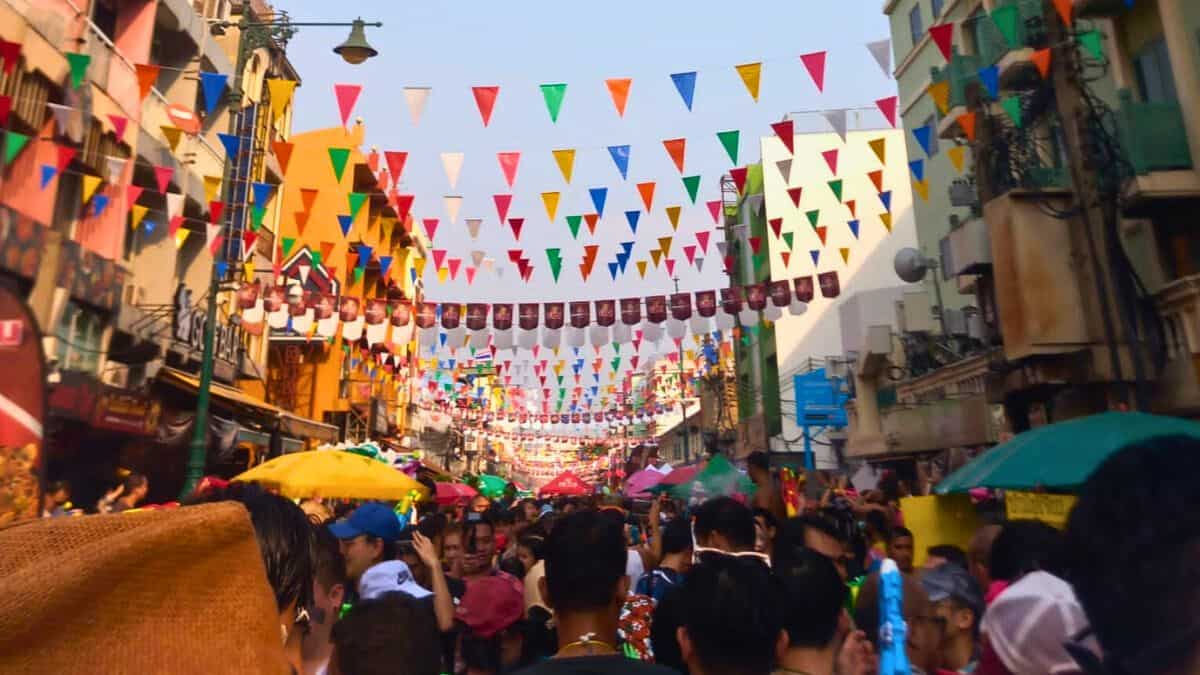Do you dare to get splashed? You’re invited to the world’s wettest and wildest party, a colorful extravaganza open to all brave enough to join the nationwide splash zone during Thailand’s legendary Songkran Festival.
Other countries in Asia and South America have similar festivals involving soaking people with water using basins, buckets, water hoses, and pistols, celebrating a saint’s feast day, or marking the beginning of Lent. For Thais, though, it signals the start of the Thai New Year around mid-April.
Why throw water at people? Is this a ritual? Is it symbolic? How does dousing and splashing water at people fit into Thai culture? Let’s find out the answers and other interesting details in this article about Songkran. Read on.
Celebrating Thailand’s Songkran Festival

Every mid-April, the vibrant festivity of the Songkran Festival brings the Land of Smiles to life, uniting families from across the nation and beyond to joyously celebrate the Thai New Year. The significance of water in this festival goes beyond mere splashing. It symbolizes cleansing and renewal. Songkran paves the way for a fresh start through the ceremonial act of “washing off” past misfortunes and sins. Songkran originates from the Sanskrit word for “passing” or “approaching,” marking the passage from one year to the next.
While the Songkran Festival is widely recognized for its exuberant water festivities, its essence lies in rekindling familial bonds and honoring religious roots. Beyond the energetic outdoor celebrations, quieter districts host Thailand temple visits where people sprinkle Buddha statues with scented water for good luck. Families engage in morning rituals, including almsgiving and pouring water on the elders’ hands, as a gesture of respect.
The Songkran Festival, spanning three days from April 13–15, extends into a week of nationwide celebrations, recognized as a national holiday in Thailand. This auspicious period marks the Buddhist calendar’s shift to a new solar year. It aligns with celestial movements, as the sun’s entry into the Zodiac sign of Aries signifies the commencement of the traditional Thai New Year.
Where To Celebrate Songkran and Have Water Fights
Undoubtedly, the most popular part of the Songkran Festival is the water fights. You’ll encounter people drenching each other over the streets with water guns, buckets, and pressure hoses so no one slips by without getting wet or sprayed with water!
Songkran began as a Buddhist custom where people lightly sprinkled water to represent cleaning. Over time, it became a fun game of splashing water on each other. In recent years, the whole country has joined in, creating a huge water fight enjoyed by millions.
While New Year celebrations take place across Thailand, certain locations offer unique experiences for your Thailand travel:
1. Bangkok
Bangkok stands out as the most popular city for festivities, especially among tourists.
- Khaosan Road: the “backpacking heart of Bangkok” transforms into a vibrant water battleground during Songkran. Expect massive crowds, pulsing music, and nonstop water fights.

- Silom Road: the city’s LGBTQ-friendly hub erupts with lively pool parties and a bustling nightclub scene.
- Wat Pho: Witness the sacred bathing of the Emerald Buddha statue, a centuries-old ritual performed by high-ranking monks.
2. Chiang Mai
Chiang Mai’s ancient walls and shrines provide a captivating backdrop for a truly cultural Songkran experience.
- Thapae Gate: Immerse yourself in the heart of the city, where parades featuring elaborately decorated floats, marching bands, and graceful dancers take center stage.
- Ping River: As dusk falls, see the enchanting Yi Peng ceremony, where thousands of hand-crafted lanterns illuminate the night sky with a breathtaking glow.
3. Phuket
In Phuket, sun-drenched New Year festivities meet a demonstration of cultural heritage.
- Patong Beach: This iconic beach becomes a soaked party haven during Songkran, where partygoers exchange greetings amidst laughter and joyous dances.

- Wat Chalong: Experience the centuries-old Wai Khru ceremony, where students pay respect to their teachers with offerings and blessings.
Other Activities and Symbolisms During Songkran
Spring Cleaning Ritual
Preparation for the Thai New Year involves more than just festivities. The first day of Songkran is dedicated to spring cleaning homes, schools, and public spaces. This ritual not only welcomes the new year with a clean slate but also symbolizes the removal of negativity and bad luck.
Diverse Festivities
Songkran offers more than just water festival fights. The celebration features a rich lineup of activities, including shadow puppetry, pop-up stages with live music, folk dancing, and beauty pageants.
Culinary Delights
Amidst the festivities, Thai food bazaars abound, serving up local delicacies such as Khao Chae (jasmine rice), Pad Thai, and mango sticky rice, providing a delightful culinary experience for participants.
Temple Visits
Before the afternoon revelry in the scorching heat begins, Thai people dedicate their mornings to temple visits with their families and relatives. In the temples, they offer alms to Buddhist monks to honor their spiritual roots and receive blessings.
Song Nam Phra Tradition
Another religious tradition during Songkran is Song Nam Phra, where locals sprinkle Buddha images with scented water. This ritual is believed to bring prosperity and good fortune for the upcoming year, serving as a cleansing act and a gesture of respect for Buddhism.
Din Sor Pong Symbolism
Beyond water’s central role, din sor pong, a paste made from white limestone powder, plays a significant role. It symbolizes protection from evil spirits, and during the celebration, people apply this paste on each other’s cheeks and necks as a gesture of blessing.
Helpful Tips During Songkran Celebration
- When attending the Songkran Festival, expect to get wet or sprayed with water. Wearing sunglasses or goggles can help cover your eyes.
- Songkran takes place every April, the hottest month of the year, with temperatures soaring to 95°Fahrenheit (35°Celsius). Keep cool by bringing a hat and sunscreen to shield yourself from the heat.
- If you plan to bring a camera, make sure to pack a waterproof case for it.
- Remember that banks and government services will be closed during Songkran since it’s a public holiday.
- Drink alcohol responsibly in the appropriate places.
- Respectfully avoid others who don’t want to get wet, like motorcycle drivers.
Additionally, consider protecting yourself with travel insurance such as SafetyWing, which can cover medical emergencies, trip cancellations, and other unforeseen incidents during your stay. Use the widget below to snag the perfect policy for your needs and travel with peace of mind knowing you’ve got your back covered, no matter what adventures come your way!
Frequently Asked Questions – Songkran Festival
What Does the Songkran Festival Celebrate?
The Songkran Festival, Thailand’s paramount annual event, welcomes the Thai New Year with lively street gatherings where people splash water on each other. Water is a significant element of the Songkran Festival, symbolizing fortune, renewal, and gratitude for past blessings.
What Is Songkran Also Known As?
Songkran is also known as the Thai New Year or Solar New Year. The 3-day festival marks the transition to a new year on the solar calendar, where the sun enters the Zodiac sign of Aries.
Which Countries Celebrate Songkran?
Songkran is primarily celebrated in Thailand but is also observed in neighboring countries like Laos, Cambodia, Myanmar, and Malaysia. Songkran may have distinct names and customs in these countries, yet it still commences the New Year with water-related festivities.
Conclusion – Celebrate Songkran Festival
The Songkran Festival, arguably one of the world’s best and most fun-filled celebrations, can bring out one’s inner child with all the water fights and water sloshing. It signals the coming of the new year and symbolizes cleansing, renewal, and new life.
Practice greeting your friends and the locals with this phrase: “S̄uk̄hs̄ạnt̒ wạn s̄ngkrānt̒!” (pronounced as “Sook-san wan Songkran!”) Happy Songkran Day!
Your Ultimate Travel Guide & Booking Resources
Skyscanner is my trusted ally for booking flights, guiding me to the perfect travel options while making the journey planning process a breeze with its user-friendly interface and extensive search capabilities.
12Go Asia is my ultimate travel companion in Asia, offering the best budget service platform for seamless booking of trains, buses, ferries, and flights, ensuring every adventure unfolds smoothly and effortlessly.
Booking.com is my ultimate lodging partner. It offers many accommodations worldwide and simplifies my travel experiences with its user-friendly platform and unbeatable deals.
Get Your Guide is my go-to for personalized travel experiences, enriching my journeys with unique tours and activities curated to my interests, making every adventure unforgettable and tailored to my preferences.
SafetyWing is my peace of mind on the go, offering comprehensive travel medical insurance with affordable plans and hassle-free claims, ensuring I can explore the world worry-free, knowing I’m protected wherever I roam.
LifeStraw Go Bottle is my trusted hydration companion for outdoor adventures, filtering water on-the-go to keep me safe and hydrated, ensuring every hike or travel experience is worry-free and enjoyable.
Related Reads:
- Fun Facts About Thailand: Fascinating Highlights You Should Know
- Scuba Diving in Thailand – 16 Best Scuba Diving Destinations
Founder of Spark Nomad, Radical FIRE, Copywriter
Expertise: Personal finance and travel content. I’m a full-time traveler, and I’ve been to 49 countries and 5 continents.
Education: Bachelor of Economics at Radboud University, Master in Finance at Radboud University, Minor in Economics at Chapman University.
Over 200 articles, essays, and short stories published across the web.
Marjolein Dilven is a journalist and founder of Spark Nomad, a travel platform, and Radical FIRE, a personal finance platform. Marjolein has a finance and economics background with a master’s in Finance. She has quit her job to travel the world, documenting her travels on Spark Nomad to help people plan their travels. Marjolein Dilven has written for publications like MSN, Associated Press, CNBC, Town News syndicate, and more.

